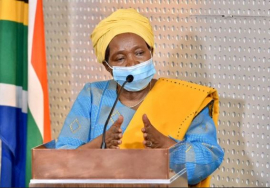
Government says its decision to reintroduce the ban on alcohol, as well as a curfew, is evidence based, and linked to its efforts to combat COVID-19 in the country.
On Sunday, President Cyril Ramaphosa reintroduced the ban on the sale and distribution of alcohol as well as a curfew as an additional measure to bolster the country’s fight against COVID-19.
The reinstatement of these measures come as the country recorded 276 242 confirmed cases, of which 4 079 had resulted in related deaths.
Announcing the measures on Sunday, President Ramaphosa said the country was recording 12 000 new cases daily.
In a briefing on Monday, the National Coronavirus Command Council (NCCC) unpacked government’s rationale behind the stringent measures.
“On the issue of evidence and rationale, with regard to Cabinet’s decision and the National Coronavirus Command Council (NCCC), we do receive evidence and with regards to alcohol, tobacco including the issues being raised of taxis, we did receive evidence and we are convinced that the decisions that were taken are rationally related to the fight against COVID-19. I can state that health did provide statistics which are clear evidence that if we did not suspend the sale of alcohol, the health sector is going to really struggle,” said Justice Minister Ronald Lamola.
With 12 058 COVID-19 cases recorded by Sunday, the Minister said the measures were reintroduced to enhance government’s risk adjusted strategy that aims to save lives while maintaining livelihoods.
In a bid to limit movement, government reintroduced a curfew between 9pm and 4am.
“In the world we are number 25 in terms of population size but already we are number 10 in the number in terms of cases and in the number of cases per day we are even more advanced so we need to take every measure,” said Cooperative Governance and Traditional Affairs Minister Nkosazana Dlamini-Zuma.
The reintroduction of the curfew means only people undertaking essential and permitted services will be permitted on the road in between these times provided they have permits.
“The virus doesn’t move, it is spread by people, part of limiting the movement of people is to actually limit the spread of the virus. It is for this reason that the curfew has been brought back,” said the Minister.
Movement during curfew times is also permitted for those seeking medical assistance.
Family visits remain prohibited
Highlighting the inter-generational nature of families, Minister Dlamini-Zuma said family visits remained prohibited due to the risk they pose for older family members.
Older adults, in particular those aged 60 years and above, and people with underlying health conditions are at higher risk of developing severe forms of COVID-19.
Face masks mandatory in public
With face masks punted as the key tool in the fight against COVID-19, government introduced a penalty of a fine or imprisonment for failure to wear a face mask in public.
While government now permits taxi operators to carry 100% capacity for local travel and 70% for long distance travel, these will be subject to strict health protocols, measures to ensure air circulation and the wearing of masks by all passengers and drivers as well as conductors.
Beaches remain closed
Under the stricter measures announced, parks will remain open for exercise but beaches will remain closed.
“We have retained the regulations that permit longer exercise hours, and the utilisation of parks for this purpose and this purpose only but we cannot open beaches as they carry with them higher risks.
“Going to the beach is still not permitted and health [department] feels that if people are in large numbers that can spread the virus so that is why it is still not allowed,” said Dlamini-Zuma.
Interprovincial travel still not allowed
Under the gazetted regulations, interprovincial travel remains banned
“As we have seen that travel between low and high concentration zones have made virtually all our country a hot spot. In this regard, permits will have to be secured for interprovincial travel,” said the Minister.
The uses of hotels, bed and breakfasts, lodges for leisure activities, Dlamini-Zuma clarified, is prohibited.
At this stage, the use of such establishments is only permitted for persons travelling for work or business purposes or where these facilities are used for quarantine or where there are remaining tourists.
Permits
Lamola said the requirement for permits for those out on the roads will be mostly enforced during the curfew period between 9pm and 4am.
However, the Minister said people could still be asked by law enforcement where they are going or to produce their permits during the day.
“It is important for us that whenever we leave our places of residence, we have a reason. If it is not necessary, let’s stay at home and carry out our responsibilities from home,” Lamola said.
The Minister said people may still make their comments on the regulations, as some of these issues are still being debated in various courts.
“At this stage, we have agreed that the public can still make any other comments on the regulations that they may deem necessary.”
In his address to the nation on 12 July, President Ramaphosa announced that a curfew will be put in place between 9pm and 4am, as a means to reduce the likelihood of trauma cases and pressure on hospitals.
“Apart from people who need to travel to and from work, or who need to seek urgent medical or other assistance during this time, everyone will be required to remain at home,” the President said. – SAnews.gov.za


